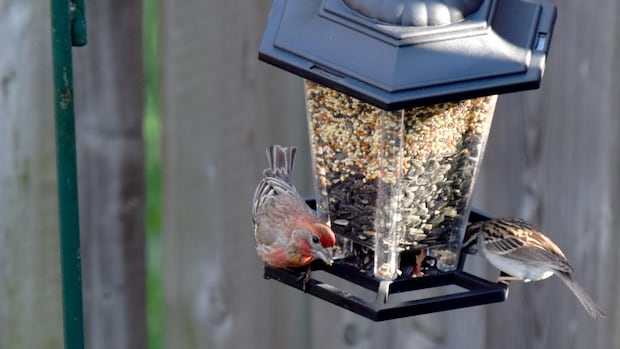Ottawa·NewAn Ottawa city councillor wants to clamp down on messy bird feeders as a way of controlling the population of nuisance animals including rodents. Messy bird feeders attracting rats and other pests, says Coun. Laura DudasJayden Dill · CBC News · Posted: Oct 20, 2025 3:23 PM EDT | Last Updated: 29 minutes agoWildlife feeding bylaws in other cities such as Toronto include an exemption for songbirds. (Katherine Bueckert/CBC)An Ottawa city councillor wants to clamp down on messy bird feeders as a way of controlling the population of nuisance animals including rodents.Orléans West-Innes Coun. Laura Dudas has tabled a notice of motion instructing city staff to amend its animal care and control bylaw or draft a new bylaw to address the feeding of wildlife.According to a draft of Dudas’s motion, feeding wildlife causes animals to become dependent on humans for food and makes them more aggressive, increases the risk of disease transmission and attracts rodents such as rats and mice.Dudas told CBC that while people set out with the intention of feeding birds, they end up attracting other animals.”You put up a bird feeder and you’re going to find a squirrel going up into it,” Dudas said. “The next thing you know you’ve got raccoons, and they’re having babies … skunks, it just kind of compounds.”Other municipalities in Ontario have regulated the feeding of wildlife to different extents.The City of Toronto’s animal bylaw prohibits feeding wildlife on public or private property, but it makes an exception for songbirds as long as the feeder “is kept in a sanitary condition and does not act as an attractant to other wildlife,” according to the city’s website.Oakville, Vaughan and Brampton have similar bylaws. Feeding wildlife in Hamilton could lead to a $10,000 fine for a first offence and $25,000 for a repeat infraction. Mississauga’s maximum penalty for breaking its bylaw is $100,000.A displacement problemNot everyone shares Dudas’s assessment of the situation, however.Bob Volks, owner of the Gilligallou Bird store in Almonte, said developers and city officials need to consider their own impact on the natural habitat “before shovels hit the ground.””The rat problem is displacement — it’s not a rat problem,” he said. “All of these critters have been displaced and they’re trying to find food. They’re trying to find shelter in areas outside of where they have just been displaced.”He said the unpopular rodents get a “bad rap” for “just doing their thing.”Volks said his customers from Ottawa have told him about rat infestations in their neighbourhoods, and some have stopped feeding birds as a result. But he doesn’t believe an outright ban on feeding birds is the answer”That’s maybe a Band-Aid,” he said, questioning how a total ban would be enforced.”Are there going to be people patrolling backyards?” he asked.It also denies the benefits of looking out for our feathered friends, Volks said.”Birding is a soulful experience,” he said. “It lowers blood pressure, it releases stress.Dudas is proposing that if her motion is approved, it be included in a larger bylaw review during the next term of council.ABOUT THE AUTHORJayden Dill is a reporter with CBC Ottawa. Feel free to send him your story ideas and news tips at jayden.dill@cbc.caWith files from Isabel Harder and Arthur White-Crummey
Wednesday, 4 Feb 2026
Canada – The Illusion
Search
Have an existing account?
Sign In
© 2022 Foxiz News Network. Ruby Design Company. All Rights Reserved.
You May also Like
- More News:
- history
- Standing Bear Network
- John Gonzalez
- ᐊᔭᐦᑊ ayahp — It happened
- Creation
- Beneath the Water
- Olympic gold medal
- Jim Thorpe
- type O blood
- the bringer of life
- Raven
- Wás’agi
- NoiseCat
- 'Sugarcane'
- The rivers still sing
- ᑲᓂᐸᐏᐟ ᒪᐢᑿ
- ᐅᑳᐤ okâw — We remember
- ᐊᓂᓈᐯᐃᐧᐣ aninâpêwin — Truth
- This is what it means to be human.
- Nokoma











